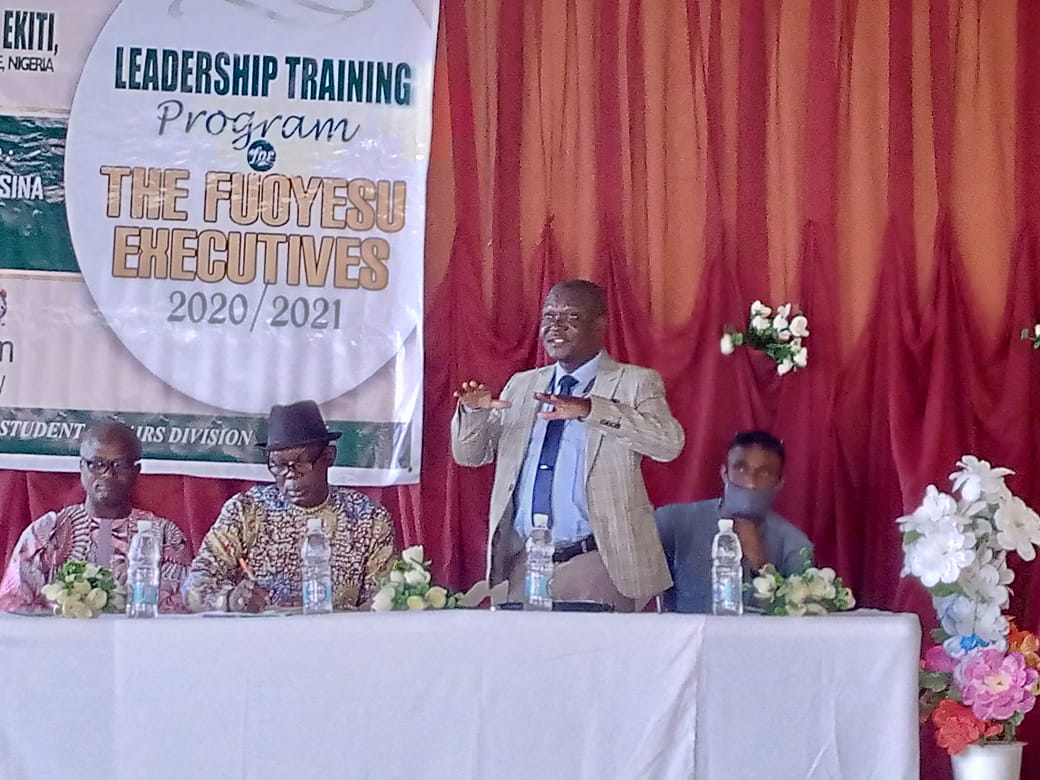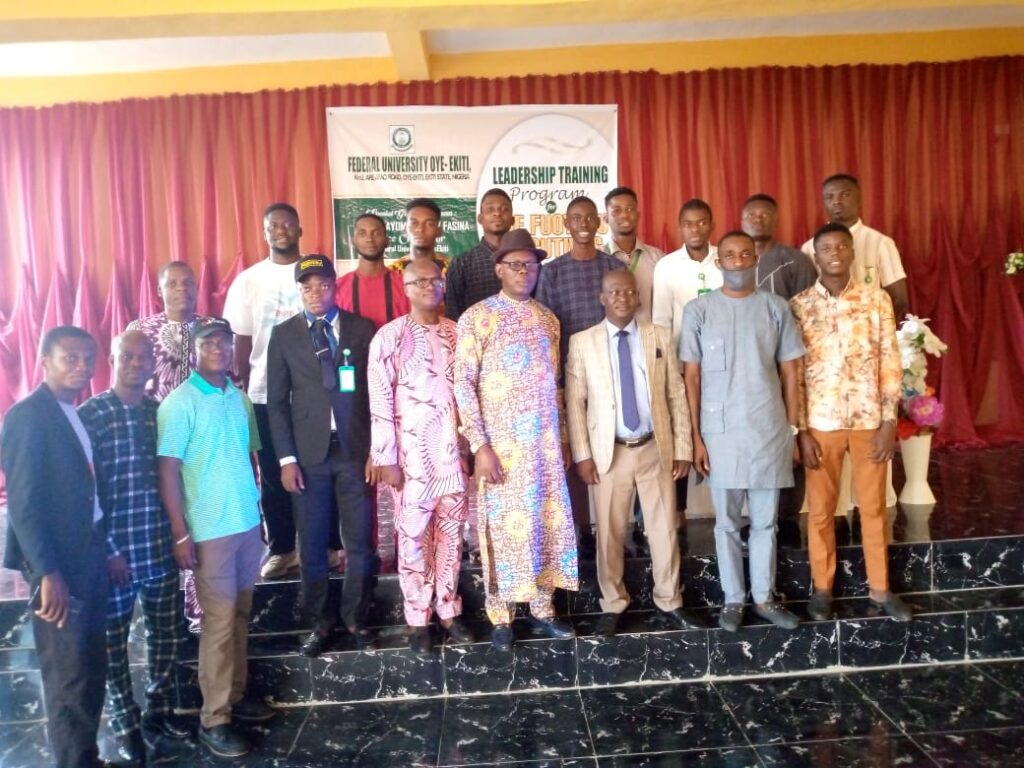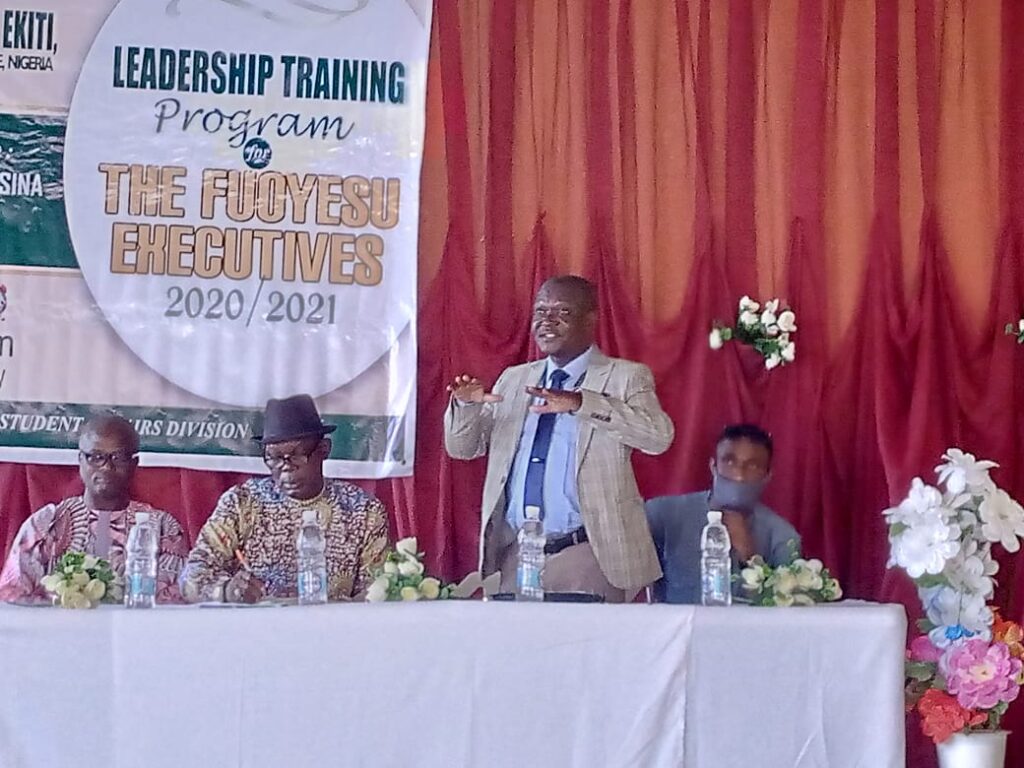
The Federal University Oye-Ekiti (FUOYE), has sponsored professional leadership training for the newly elected Executives of the Students’ Union Government (SUG) of the institution popularly known as FUOYESU.
The training programme was put together to further hone the leadership skills of the students’ leaders and also ensure that they imbibe values that would make them successful in their bid to provide purposeful leadership for the now over 30,000 students of the University.
Tagged: UNIONISM WITH CIVILITY AND HUMILITY, the training programme is a two-day event which held from August 25-26, 2021 at the prestigious hall of the Fabian Hotel in Ado-Ekiti, Ekiti State.
According to a press release co-signed by the Public Relations Officer (PRO) of the University, Foluso Ogunmodede, and Special Adviser on Media Matters to the VC, Woke Balogun, the event featured lecture series by Resource Persons whose leadership skills and success have been proven by years of experience.
Prof. J. Shola Omotola, FUOYE’s Deputy Vice-Chancellor, Administration, represented the Vice-Chancellor, Prof. Abayomi Sunday Fasina, to deliver the Keynote Address on Leadership.
Prof. Omotola defined leadership from two broad perspectives, i.e leadership as responsibility and as a resource. He said: “I want you to see leadership from two broad perspectives, as Responsibility and as a Resource. Leadership as responsibility connotes that you are in a position of responsibility, where a person occupying that office must shoulder certain responsibilities. Some of our problems at various levels occur because people no longer take leadership as responsibility and this responbility must be shouldered by the leader.
When anyone fails to shoulder his or her responsibility, he is not fit for the role of leadership.

” The same thing applies to all students leaders here especially the President, you must take responsibility in leading them.
They surendered their rights to you to elect you as their leader in exchange of the responsibility you will shoulder for them.
In political science, it is called a social contract between you and the students. They have fulfilled their own part of the social contract. They have given you the mandate in expectation of certain things, one of which is that you must be there for them, you have to be available and others.
You operate an open door policy.
You have been saddled with the responsibility of that office and the students expect you to ensure their welfare. Wether we like it or not , things would not always go rosy. You are the bridge between them and the Management, you are the one to ensure you mediate between them and the Management. You also owe those who have opposed you during the election a responsibility to take care of them
Part of the responbility of a leader is to find a balance among the different parties .
Leadership comes with certain benefits but even those benefits come with responsibility. You must be careful, vigilant and beware of women.
“Leadership is also a Resource because it is not common. Not all who occupy leadership position are leaders. An optimum performance is an indication of leaders who are truly leaders but when this is absent, such person is not a leader.
A leader who is worth the salt would not act outside the dictates of the constitution that guides his leadership. Leadership is a master resource because it coordinates other resources. It harnesses these other resources and put them into productive use in ways that will be beneficial to humanity and elicit progress. Part of your responsibility is to honour your promises and if there is any reason it can not be fulfilled you must apologize and explain to the students.
“You must be able to manage crisis situation in a way that would not jeopardize the peace ad stability on campus,” he concluded.
Speaking in the same stream of thought, Comrade Moses Ademiloye, who is the Special Assistant on Youths and Students matters to the Governor of Ekiti State, Dr. Kayode Fayemi described a leader as a chief servant.
He disabused the minds of youths who erroneously think that leadership puts them above others in order to dictate wholesomely for them, saying: “Many have been disillusioned into thinking that leadership puts them above board, makes them overlords. This is extremely a wrong notion. A leader is a servant just as we have the popular coinage of Servant Leader.
“In this instance, a leader does not complain when things are not going too well and must make a lot of sacrifice. l like to explain two types of leadership approaches, the Top -down style of leadership also known as Command style, where a leader dictates everything. The other style of leadership, is the grassroot approach of shared leadership which allows for collective responbility in leadership. This is a better approach.
“Start crafting what your dream or vision will be so we can leave a legacy that people will celebrate and continue with when you are gone.
“A leader must not try to amass wealth regardless of the huge temptation. Permit me to draw from the statement of the late Odumegwu Ojukwu, he is qouted as saying: “there is nothing more counter-productive in leadership than corruption”.
“Please, be accountable to all, don’t be tempted by money and be above board in all your dealings. Let me also remind you that your election has been by merit, hence you bear the burden of proving that merit.
A significant quality of leadership is the ability to listen more than speak. For those who know His Excellency, Gov. John Kayode Fayemi, he is a good listener. The more you speak, the less you listen. The message is clear, listen more and you will understand people more and be able to manage them effectively.
” Always leave room for self evaluation. Think about all you do, put yourself in the shoes of the students you represent and then evaluate yourself. That way, you will egde closer towards good leadership. Also note that as leaders, you are role models for a lot of other students, so be cautious of what you do and how you do them.
“On a final note , you have the Vice-Chancellor here. It is a sign that you are not enemies but are expected to work closely in making the lives and learning process for students smooth and worthwhile. You are the bridge between students and the University Management. Do well not to fall or burn, but be civil in all your dealings, “Ademiloye advised.

Another resource person was Bishop Godly Opukeme, a member of the Joint Committee of Educational Development in Nigeria, as well as the National President of Private School Owners in Nigeria.
In his lecture entitled: The Negative Effects of Students Demonstration in the Smooth Running of the University System, he urged the new FUOYESU Excos to shun violent protests that could lead to destruction of life and prosperity.
His words: “A University connotes universality. It is an elevated part of the society where the town, community/industry and the academic interact. Higher educational institutions are established with the aim of giving any student who enrols, a very sound and qualitative education, to be able to function effectively in any environment he or she finds him or herself and become more productive, self-fulfilling and attain self-actualization.
Leadership is sometimes by endowment and also by learning. Do not be an erratic leader who doesn’t listen. A leader must be humble and listen so he won’t fail.
“Maintain a Mentor-Mentee relationship with your Dean of Students, Prof. Dosu Malomo. Your first mentor should be your Dean. There must be a good relationship between the mentor and you, the Mentee. Do not allow pride to cause problem between you and your mentor. Do not engage in violent protests to solve issues with the Management, that is an obsolete method. Always dialogue and dialogue till the matters are resolved.”
Rounding up the lecture series was
Dr Tella Adeniran Rahmon, the
Resident Electoral Commissioner,
Independent National Electoral Commission,
Ekiti State. In his lecture entitled: “The challenges of Youths in Governance Positions and how to Mitigate them”.
Dr. Tella established the need for governance and government as existing to ensure orderliness, management and administration in any society.
He said: “Governance is the process of governing or overseeing the control and direction of something such as a country or an organization. In this context the term is not tied to any position, but is merely defined as a process of control and direction. The term is often used synonymously with the word leadership.
Challenge – a position of thing(s) or situation which posses as a difficulty or obstruction in the achievement or attainment of set-out task or objectives.
Youth is a time of ones life when one is young. Especially the period between childhood and maturity. It is a stage of life when one is characterized as being most active and productive. Arguably the ages between 18 to 35 years.
“Since the passage of the Bill of the not too young to rule into law, it is difficult to say much progress has been recorded in the participation of Nigerian youths in governance. The question which begs for answer is WHY?!!. The answer thereof has been pinned to several factors by different writers. Each laying logical arguments to justify their claim.
These identified challenges range from alleged ignorance amongst the youths, financial dependence/poverty, illiteracy, lack of mentorship, political godfatherism, poor leadership skills among the youths, corruption, the get rich fast syndrome etc. Most importantly, the Misconception of the Notion of government and governance.
“According to (Galstyan 2019), young people are not interested in politics (the major known path to attaining governance positions) because politics does not represent the matters that are important to them. Although arguable, there appears to be some truth in Galstyan’s submission in today’s political dispensation. The trajectory of governance, politics and electoral process supports this assertion. The reason behind such ignorance cannot exactly be pinned to a particular factor.
“However, many attribute it to the fact that the task of governance is saddled with several paper works which many youths consider as boring, stressful and a waste of resourceful time that may have been deployed to businesses which earn them fast money to satisfy their immediate basic needs.
“
Offiong (2018), opines that the financial capacity to contest for governance positions and would rather prefer to remain politicians lackey’s as advanced democracies like Nigeria still elect older generations as their leaders.
“It is however my opinion that this view is very much fallacious because although elections are integral part of political participation and governance, it is not merely restricted to contesting elections.
” …one particular challenge which is of great concern to me is the misconception of the notion of government and governance… governance is the processor governing, directing and controlling the activities of country or organization.
“Implicitly, this goes beyond holding a positions in governance. Apparently, this is contrary to the idea of governance held by most youths. Governance, which is synonymous with leadership is the process or art of directing and controlling the actions/activities of a group towards actualizing specific goals. Many youths maintain the idea that the task of governance (leadership) is merely a consequence of holding positions. This is a wrong notion which must be corrected.
“The task of governance/ leadership is one which is very demanding and onerous. This burden falls on us all everyday, individually and collectively, youth or aged, and we must all bracen up to this task. Whether one is a holder of public office or not is immaterial. Governance/ leadership is not a one man business or the business of office holders. It is our individual and collective responsibility.
“Progressively, the challenges of youth participation in governance position is not one which a general solution can be proffered to. Especially, because these problems differ from region to region, society to society and organization to organization. One must, study the peculiarities and dynamics of his region, organization or society to identify these challenges and in so doing proffer solutions to them. As the saying goes charity begins at home, the change must begin from the smallest units of such society, organization, or country.
“Nonetheless, some common solutions or mitigating strategies to adopt in addressing these various forms of challenges includes encouraging, promoting and ensuring youth participation and involvement in all forms and levels of governance, organize summits, symposiums and all platforms of the like which promote, sensitize, create and develop leadership skills and the spirit and will thereof. This will better prepare them and spur them to take up the responsibility of governance and leadership.
“More so, more youths should be encouraged and given the opportunity to engage in and undertake leadership positions as this will give them a sense of belonging and more so an understanding of their role and importance in the governance of their society. More so the potentials which their participation holds.
In conclusion, the need for governance in society, arises every second.
“The task of governance is indeed very demanding, onerous and tiring. The role and importance of the youths thereof cannot be overemphasized. Especially considering the energy, agility, energetic and innovative drive which they possess, in tackling issues. This is greatly indispensable in discharging the task of governance. I therefore seize this opportunity make this clarion call to all youths of this country to strive to get involved in the art of governance and leadership, irrespective of whatever positions one posses or not. Bearing in mind that no task of great good is ever discharged without facing challenges. “
